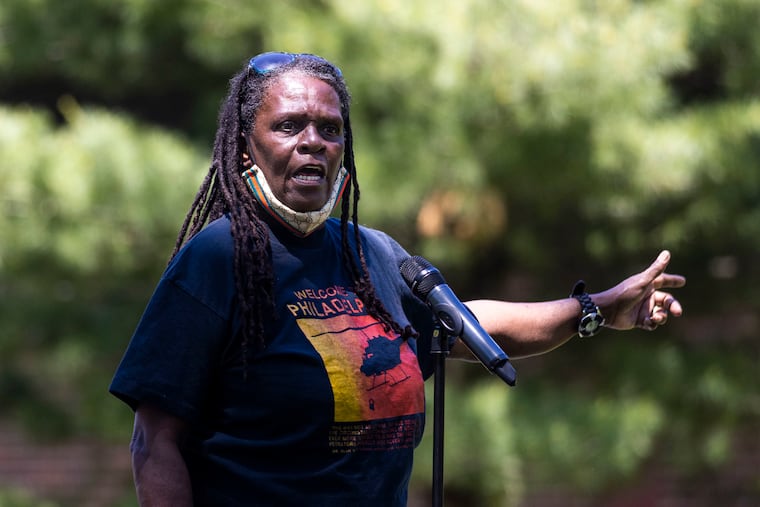Consuewella Dotson Africa, longtime MOVE member, dies at 67
Africa —a spirited fixture for years at protest events hosted by MOVE and other organizations — was hospitalized for about two weeks with breathing problems prior to her death.

Consuewella Dotson Africa, an outspoken longtime member of the MOVE family whose daughters were killed when the city bombed the group’s West Philadelphia compound in 1985 and who served 16 years in prison following the group’s 1978 clash with police in Powelton Village, died Wednesday, MOVE members confirmed. She was 67.
Ms. Dotson died at the Hospital of the University of Pennsylvania with her husband, Frank Edwards; her biological brother and sister — Zelma and Isaac Dotson — by her side; and her remaining child, Lionel “Lobo” Dotson on the phone, according to MOVE family members.
Ms. Dotson — a spirited fixture for years at protest events hosted by MOVE and other organizations — was hospitalized for about two weeks with breathing problems prior to her death, though her cause of death is not yet clear, said Janine Africa. Janine said the two met in 1973 at the Powelton Village compound and were like sisters.
“She was exposed to COVID, but she had gotten over COVID, and the doctors were saying she started having lung problems, and they were saying it was because of stress. That’s understandable,” said Janine Africa.
After a life punctuated by grief, last month’s anniversary of the city’s bombing of the compound that killed two of Ms. Dotson’s children, Katricia “Tree” Africa, 14, and Zanetta “Netta” 12, and the recent revelation that remains believed to be from Tree had been used by the University of Pennsylvania Museum and Princeton University as study aids, had troubled and weighed heavily on her, Janine Africa said.
» READ MORE: Controversy flares over how Penn and Princeton treated a MOVE bombing victim’s remains
Days after former Health Commissioner Thomas Farley resigned after admitting to ordering remains of MOVE victims cremated and discarded without notifying their relatives, news surfaced that those plans were never carried out, and that the remains were not destroyed.
“The situation just put so much on her that it tore her down and she couldn’t come out of it,” Janine Africa said.
» READ MORE: Philly says it found the remains of the MOVE bombing victims it thought it had cremated and discarded
At a news conference in April about the universities’ mishandling of the remains, Ms. Dotson broke into tears and stormed out.
“I mean, it’s just continuous, nonstop, vicious, violent, sadistic, ongoing abuse of the MOVE organization,” she told reporters. “Why? Because we stand up and tell the truth about this rotten reformed world system.”
In 1978, she was among MOVE members charged in the death of Police Officer James J. Ramp during a standoff at the group’s Powelton Village house. MOVE members have said that Ramp was accidentally killed by another officer. Ms. Dotson spent 16 years in state prison for simple assault, and was paroled in 1994.
It was during a prison visit to the MOVE women that Mike Africa Jr., whose parents also served prison time, first remembered meeting Ms. Dotson, whose “personality fit her look: very fierce.”
“Consuewella was no-nonsense. She didn’t play games. She was fun, and she laughed a lot when she was happy,” Africa Jr. said. “But if she felt like somebody was trying to pull the wool over her eyes, or pull the wool over somebody else’s eyes in her presence, she ... didn’t bite her tongue. She would tell you what she felt.”
Born Aug. 11, 1953, Consuewella Dotson was raised in South Philadelphia and graduated from a Catholic school, Janine Africa said, and started following the teachings of MOVE founder John Africa in the early 1970s. She lived with her husband of more than 20 years, Frank Edwards, a non-MOVE member, in Southwest Philly, MOVE members said.
“It’s a tough one,” said Mike Africa Jr. of the death. “I think probably mostly because, you know, after so many years of working to get to some place of peace. You work so hard to get people home from prison, then it finally happened that you barely have enough time to enjoy it before you find out that the family was murdered and their bones are being played with.”
Sue Africa, who met Ms. Dotson in 1972, remembered her as “very vibrant, very alive, a very strong runner, very strong period, very vocal and assertive.”
Sue also spent time in prison following the 1978 MOVE standoff with police. While she was behind bars, Sue’s son Tomaso died in the same 1985 bombing that claimed two of Ms. Dotson’s children. In total, the bombing killed 11 people — including five children — and razed two city blocks.
”This thing with the bones really stirred up some serious stuff with her. I personally, and so does my family, believe this had a big part in why she died so suddenly,” she said.
Months before her death, at the April news conference, Ms. Dotson passionately spoke about her MOVE family — a group whose ideology centers on Black liberation and back-to-nature philosophies.
“The MOVE organization is not just a bunch of people you see here,” she said. “We are a family, a unit. We stand together. This is my family. The family of John Africa. Our belief is life. Our children is life. Animals are life. Therefore, we stand together and fight for one life.”